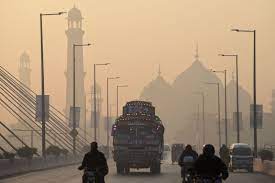By Muhammad Mohsin Iqbal
Smog, a noxious blend of smoke and fog, has descended upon major cities in Pakistan, casting a murky haze over daily life. The term smog encapsulates a concoction of pollutants, including ground-level ozone, particulate matter, nitrogen oxides, and volatile organic compounds. The detrimental effects on human health and the environment have reached alarming levels, prompting urgent measures.
In recent months, cities such as Lahore have witnessed a surge in smog levels, disrupting daily
routines and impacting various sectors. The pervasive smog has led to health issues, particularly
respiratory problems and eye irritation, prompting concerns across the nation.
The severity of smog is measured through the Air Quality Index (AQI), with Pakistan
experiencing consistently high levels, especially in major urban centers. The AQI scale, ranging
from "Good" to "Hazardous," provides a gauge of the potential health risks associated with air pollution.
The surge in smog levels has not spared crucial sectors, with transportation and education
bearing the brunt. City officials in Lahore had to temporarily close educational institutions due
to health concerns. Additionally, international travel faced disruptions, with flights being
redirected due to the prevailing smog.
The primary culprits behind the escalating smog crisis include agricultural burning, industrial
emissions, vehicular pollution, and construction activities. These factors contribute to a thick
haze that blankets cities, adversely affecting air quality and visibility.
Beyond health concerns, smog wreaks havoc on the environment. Reduced visibility leads to
transportation issues and hazardous driving conditions. Furthermore, smog contributes to
climate change, affects plant and crop growth, harms wildlife, and inflicts economic losses.
Efforts to mitigate smog require a collective approach. Individuals and organizations can reduce
the use of fossil fuels, opt for public transportation, ensure proper disposal of agricultural
waste, and implement industrial pollution controls. Planting more trees is also crucial in
absorbing pollutants.
While the government has implemented measures such as stricter emission standards and
incentives for alternative energy sources, further action is imperative. The government should
enforce more stringent regulations, encourage alternative energy adoption, provide incentives
for public transportation, support waste management efforts, and promote tree planting.
Hence, the smog crisis in Pakistan demands immediate attention and concerted efforts from
individuals, organizations, and the government. The multifaceted approach must address the
root causes, enforce regulations, and raise awareness to safeguard public health and the
environment. The urgency to protect and expand urban green spaces cannot be overstated as a
critical step towards a sustainable and smog-free future.




